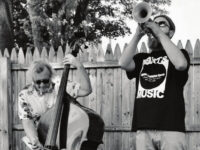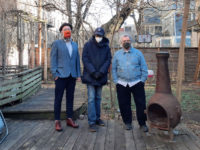Robert Henri was arguably America’s first anti-artist establishment painter, a distinction earned by his open opposition to the staid, conservative National Academy of Design in the early 20th century. Non-conventional musicians Michael Bisio, Kirk Knuffke and Fred Lonberg-Holm chose Henri as a beacon for inspiration for their latest collaboration, and while there’s a century separating the painter and the musicians, the yearning for free-thinking artists to break outside the fences imposed by institutional art has never wavered over that time. That’s certainly true for jazz.
The Art Spirit puts into music the hard realism that Henri invested into his illustrations. Recorded just days before Mike Panico – the subject of their last album – unexpectedly passed away, the bassist Bisio, cornetist Knuffke and cellist Lonberg-Holm again found inspiration through common cause.
I don’t know of prior bass/cello/cornet trios, but Bisio, Knuffke and Lonberg-Holm have clearly set the standard for it. When they perform group improv, there is always a strong sense that they know where they’re going. Knuffke is cheerfully bopping over the mad scraping and plucking down below for “Not A Souvenir Of Yesterday,” and the slight discord is far more interesting than if they all tracked together too closely.
Bisio’s “r. henri” is a much more pensive affair, carried out by the combination of the arco bass with the arco cello, making it closer to a modern classical piece than a jazz one.
Lonberg-Holm’s cello jousts pointedly with Knuffke’s cornet for “Both Keys Belong To You” as Bisio finds that elusive harmony at the center and firmly anchors it. Bisio and Lonberg-Holm later create a thick sonic wall of frisky bowing, nearly sounding as of a single unit. It ends with a very engaging tête-à-tête between Knuffke and Bisio.
One of the special skills Knuffke possesses is the ability to make his cornet similar to a saxophone – especially when using the soprano cornet – as he does for the opening portion of “Use Them.” “Orange Moon Yellow Field” is another contemplative piece from Bisio and the interaction between the bass and the similar-sounding cello borders on clairvoyant.
“Things Hum” is the final Bisio piece (the other selections are group-composed), and one where Lonberg-Holm plucks on his cello most prominently while Knuffke also changes tactics by blowing with a mute for a spell. But it’s Bisio’s persistent bass figure at the heart of the song.
Lonberg-Holm employs electronics here and there, sometimes to expand his sound and other times to make the cello sound a little bit weird, as heard on “Like Your Work As Much As.” Bisio meantime is laying down brawny bass shapes that enables the other two to roam freely.
Bisio and Lonberg-Holm play with a lot of percussive intent on “A Dog Likes To Gnaw A Bone,” making the song reverberate and shake the senses.
Michael Bisio, Kirk Knuffke and Fred Lonberg-Holm are in a sense artistic rebels as Robert Henri was, but it’s important to understand that their music isn’t outside establishment music just for the sake of being outside. One only needs to hear the unity and sense of purpose that flows from The Art Spirit.
The Art Spirit releases on June 25, 2021 from ESP-Disk.
- Ches Smith Quartet – ‘Clone Row’ (2025) - May 30, 2025
- James Brandon Lewis Quartet – ‘Abstraction Is Deliverance’ (2025) - May 27, 2025
- Soft Machine – ‘Drop’ (1971, 2025 remaster) - May 21, 2025




